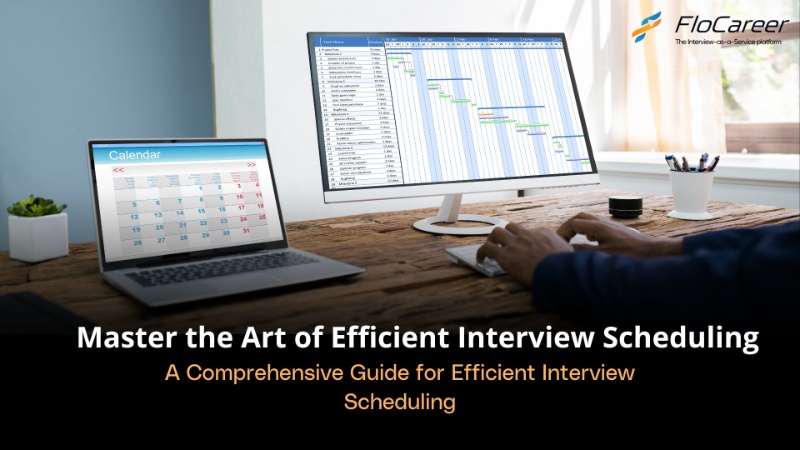Master the Art of Efficient Interview Scheduling: A Comprehensive Guide for Efficient Interview Scheduling
In a world characterized by rapid technological advancements, the interview scheduling process remains a lingering challenge for many recruitment teams. A poorly organized interview scheduling system can impede the efficiency of the entire hiring process, leading to frustration among both recruiters and candidates. In this blog, we'll explore the significance of efficient interview scheduling and provide actionable tips to streamline the process. Discover how to harness the power of technology, optimize your recruitment platform, synchronize calendars, and leverage interview scheduling tools for a seamless and candidate-friendly experience.

Why Efficient Interview Scheduling Matters
Despite technological leaps in various sectors, interview scheduling often lags behind, causing delays and potential candidate dropouts. The repercussions of a sluggish process can adversely impact the candidate experience and hinder the overall recruitment procedure. To tackle this, let's delve into strategies that ensure an efficient interview scheduling process, minimizing hurdles for both recruiters and candidates.
How to Schedule Interviews Efficiently:
Evaluate Your Recruitment Process:
Take a comprehensive look at your recruitment process, examining candidate sourcing techniques, social recruitment strategies, and the capabilities of your applicant tracking system (ATS). An impeccable candidate experience is crucial for attracting top talent. Rescheduling interviews repeatedly due to departmental issues can leave a negative impression. Identify and address any inefficiencies within your process to enhance the overall candidate experience.
Utilize a Recruitment Platform:
Leverage a recruitment platform with features that support the entire recruitment process. These platforms, often user-friendly and free, can significantly enhance efficiency and collaboration among recruiting teams. Consider incorporating FloCareer as a robust recruitment platform to streamline your processes and save valuable time.
Sync Your Calendars:
Synchronize the calendar in your recruitment system with iCalendar, Google Calendar, or Outlook for efficient scheduling and reminders. This ensures that interviews are never overlooked, and a synchronized view of the entire recruiting team minimizes back-and-forth communication, optimizing the interview scheduling process.
Create a Recruitment Folder in Your ATS System:
Establish a dedicated folder within your Applicant Tracking System (ATS) to centralize all information. This facilitates the easy sharing of interview invites with multiple candidates simultaneously. Grant access to the selection committee, promoting an effective overview of interview dates and candidate details.
Use Interview Scheduling Tools:
Embrace interview scheduling tools to simplify the coordination of interviews. These tools cut down on the back-and-forth communication, allowing recruiters to focus on improving the candidate experience. FloCareer, offers interview scheduling features that enhance efficiency and connectivity with candidates.
Provide Clear Communication with Scheduling Links:
When sending interview scheduling links, include key points in the email for better communication:
- Express gratitude for the candidate's interest in the position.
- Provide an overview of what candidates should expect during the interview process.
- Specify the interviewers' names.
- Request feedback post-interview.
- Implement Time Zones Consideration:
In today's globalized workforce, candidates may be located in different time zones. Consideration of time zones is crucial to ensure fairness and convenience for all candidates. Utilize interview scheduling tools that automatically adjust for time zone differences and provide candidates with options suitable for their local time.
Automate Interview Confirmation and Reminders:
Implement automated confirmation emails and reminders to ensure that both recruiters and candidates are well-prepared for upcoming interviews. Automated reminders minimize the risk of no-shows and provide candidates with essential details, creating a smoother and more organized interview process.
Establish Priority Slots for Critical Stakeholders:
Identify key stakeholders involved in the interview process and establish priority slots in their calendars. This ensures that critical decision-makers are available during key interview times, reducing the likelihood of rescheduling and expediting the overall decision-making process.
Centralized Communication Hub:
Create a centralized communication hub or channel for interview-related discussions within your recruitment team. Whether using collaboration tools like Slack or a dedicated section in your applicant tracking system, a centralized hub promotes efficient communication, reduces delays, and allows for quick updates or changes in interview schedules.
Post-Interview Debrief Schedule:
Schedule a post-interview debrief session immediately after candidate interviews. This ensures that feedback is collected promptly while the interview experience is fresh in the minds of the interviewers. Efficient debrief sessions contribute to quicker decision-making and a more agile hiring process.
Utilize Video Interviewing Platforms:
Explore the benefits of video interviewing platforms to conduct initial screening interviews. Video interviews allow for flexibility in scheduling, enable remote participation, and streamline the preliminary stages of the hiring process. Platforms like FloCareer offer video interviewing features that enhance efficiency and accessibility.
Dynamic Interview Scheduling:
Adopt a dynamic interview scheduling approach that allows for real-time adjustments based on changing circumstances. Unexpected events or urgent hiring needs may require quick rescheduling or additional interviews. A flexible and dynamic scheduling system ensures adaptability and responsiveness to evolving recruitment demands.
Customizable Interview Templates:
Create customizable interview templates for different roles within your organization. Having predefined interview templates streamlines the scheduling process by ensuring that relevant stakeholders are involved in each interview stage. Customizable templates save time and maintain consistency across various hiring processes.
Efficient interview scheduling is a crucial aspect of the recruitment process, impacting both recruiters and candidates. By adopting modern technologies, leveraging recruitment platforms like FloCareer, synchronizing calendars, and utilizing interview scheduling tools, you can transform the interview scheduling experience. Prioritizing a seamless candidate journey, clear communication, and feedback mechanisms contribute to an overall positive candidate experience. As you strive for excellence in your recruitment efforts, remember that a streamlined interview scheduling process is a key component in attracting and securing top-tier talent.
Check out our latest blog on Mastering Objectivity In Hiring


